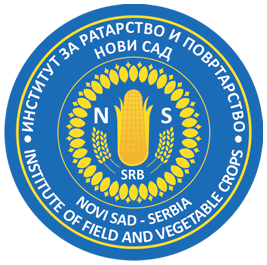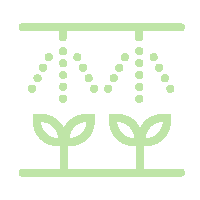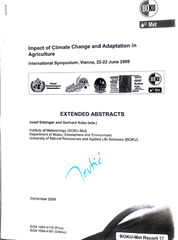Adaptation to diseases, pests and weeds caused by climatic changes and evaluation of associated risks in European regions - results from the ADAGIO project
| dc.creator | Jevtić, Radivoje | |
| dc.creator | Lalić, Branislava | |
| dc.creator | Mihailović, Dragutin | |
| dc.creator | Eitzinger, Josef | |
| dc.creator | Alexandrov, Vladimir | |
| dc.creator | Ventrella, D. | |
| dc.creator | Trnka, Miroslav | |
| dc.creator | Anastassiou, D.P. | |
| dc.creator | Medany, Mahmoud | |
| dc.creator | Olejnik, Janusz | |
| dc.creator | Nikolaev, M. | |
| dc.date.accessioned | 2024-03-04T12:21:51Z | |
| dc.date.available | 2024-03-04T12:21:51Z | |
| dc.date.issued | 2009 | |
| dc.identifier.issn | 1994-4179 | |
| dc.identifier.uri | http://fiver.ifvcns.rs/handle/123456789/4326 | |
| dc.description.abstract | It is evident that certain climatic changes have taken place in recent years. Global warming is one of them. These climatic changes have exerted high effects on agriculture, especially when it comes to the occurrence of plant diseases, pests and weeds. The risk of plant disease, pest and weed damages to agricultural crops has increased significantly. Plant species that have been intensively attacked by harmful organisms are: wheat, barley, oat, maize, sunflower, sugar beet, potato, tomato, different fruits and grapevine in several European regions and olive trees in Greece, Italy and Egypt. The occurrence of new diseases, pests and weeds is direct consequence of climate changes in: Austria, Italy, Greece, Egypt, Poland, NW Russia, and Serbia. In Bulgaria, occurrence of new harmful organisms has not been directly linked to climate changes but only indirectly. Certain harmful organisms adapted very fast their life histories to the changes and became prevalent in respect to other pests since the climate changes favored their large-scale multiplication and distribution. If the predictions of global warming (which is often accompanied by drought) in the 21st century come true, frequent mass occurrences of the cotton bollworm and other xerothermophilous pests (grasshoppers, thrips, Sunn pests, weevils, flea beetles, etc.) may be expected as well as some new species, as a result of the expanding geographic distribution of some Mediterranean species. | sr |
| dc.language.iso | en | sr |
| dc.publisher | Vienna : University of Natural Resources and Life Sciences (BOKU), Institute of Meteorology | sr |
| dc.relation | Adaptation of agriculture in European regions at environmental risk under climate change (ADAGIO), FP6 project | sr |
| dc.rights | openAccess | sr |
| dc.rights.uri | https://creativecommons.org/licenses/by/4.0/ | |
| dc.source | BOKU-Met Report / Extended Abstracts, International Symposium "Impact of climate change and adaptation in agriculture", 22-23 June 2009, Vienna | sr |
| dc.subject | climate change | sr |
| dc.subject | diseases | sr |
| dc.subject | pests | sr |
| dc.subject | weeds | sr |
| dc.subject | crops | sr |
| dc.title | Adaptation to diseases, pests and weeds caused by climatic changes and evaluation of associated risks in European regions - results from the ADAGIO project | sr |
| dc.type | conferenceObject | sr |
| dc.rights.license | BY | sr |
| dc.citation.epage | 123 | |
| dc.citation.issue | 17 | |
| dc.citation.spage | 121 | |
| dc.identifier.fulltext | http://fiver.ifvcns.rs/bitstream/id/9809/bitstream_9809.pdf | |
| dc.identifier.rcub | https://hdl.handle.net/21.15107/rcub_fiver_4326 | |
| dc.type.version | publishedVersion | sr |


